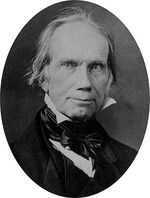
Henry Clay (12 April 1777 – 29 June 1852) was a US Senator from Kentucky from 29 December 1806 to 3 March 1807 (succeeding John Adair and preceding John Pope), from 4 January 1810 to 3 March 1811 (succeeding Buckner Thruston and preceding George M. Bibb), from 10 November 1831 to 31 March 1842 (succeeding John Rowan and preceding John J. Crittenden), and from 4 March 1849 to 29 June 1852 (succeeding Thomas Metcalfe and preceding David Meriwether). He also served in the US House of Representatives from the 5th district from 4 March 1811 to 3 March 1813 (succeeding William T. Barry and preceding Samuel Hopkins), from the 2nd district from 4 March 1813 to 19 January 1814 (succeeding Samuel McKee and preceding Joseph H. Hawkins) and from 4 March 1815 to 3 March 1821 (succeeding Hawkins and preceding Samuel H. Woodson), and from 4 March 1823 to 6 March 1825 (succeeding John Telemachus Johnson and preceding James Clark). He also served as Secretary of State from 4 March 1825 to 4 March 1829, succeeding John Quincy Adams and preceding Martin Van Buren. Clay was a founder of the liberal American Whig Party alongside John Quincy Adams, and he was also a leader of the anti-British "War Hawks" and the anti-slavery movement.
Biography[]
House of Representatives[]

Clay in 1818
Henry Clay was born on 12 April 1777 in Hanover County, Virginia, and in 1797 he was admitted to the bar after working in the Virginia Court of Chancery. In November 1797, he relocated to Lexington, Kentucky, and he became the owner of a large plantation called Ashland. In 1811, he was elected to the US House of Representatives, and he became a leader of the anti-Great Britain "War Hawks", who wanted to fight against Britain to take over Canada and to stop Britain's support of Tecumseh's confederacy of Native Americans. Clay was a head of the Democratic-Republican Party during the War of 1812, and he helped in negotiating the 1815 Treaty of Ghent. In 1816, Clay became president of the American Colonization Society under President James Monroe, and Clay helped freed African-Americans in returning to Africa and colonizing Liberia. Clay fell out with Monroe when he was passed over as Secretary of State by John Quincy Adams and, as Speaker of the House, refused to accept a nomination as Secretary of War, refused to have Monroe's inaugaration take place in the house chamber, and refused to have his inaugaration take place outside. In 1820, he masterminded the Missouri Compromise, maintaining the balance of free and slave states at 11 each; Missouri would be a slave state and Maine would be a free state.
Corrupt Bargain[]
When Quincy Adams became president, Clay became his Secretary of State, and Clay recognized the independence of all South American countries except for Uruguay, whose independence from the Brazilian Empire was disputed in the 1828 Platine War. The election of Adams was called a "Corrupt Bargain" by Andrew Jackson, as Clay had given his support to Quincy Adams in exchange for being made Secretary of State. Clay was defeated in his bids for president with the National Republicans and the American Whig Party, but he continued to pass several laws, for which he was known as "The Great Compromiser". The Compromise of 1850 admitted California as a free state, made Washington DC a free district, allowed Utah and New Mexico to decide their slavery laws, and enacted the Fugitive Slave Law. Clay died in 1852 while in office as Senator from Kentucky, and Abraham Lincoln would continue his policies when he was president.
